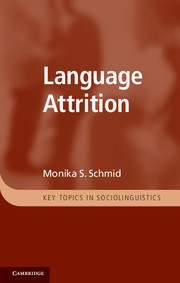Book contents
- Frontmatter
- Contents
- List of figures
- List of tables
- Preface
- Abbreviations
- 1 Introduction
- Part I Linguistic aspects of language attrition
- Part II Extralinguistic aspects of language attrition
- Part III Conducting research on language attrition – preliminary considerations
- Part IV Experimental designs for attrition research – the language attrition test battery
- Part V Coding and analysing the data
- 15 Transcribing and coding free speech: the CHILDES project
- 16 Coding and reporting experimental data
- 17 Interpreting your data: inferential statistics
- 18 Conclusion
- Glossary
- Notes
- References
- Index
17 - Interpreting your data: inferential statistics
Published online by Cambridge University Press: 05 June 2012
- Frontmatter
- Contents
- List of figures
- List of tables
- Preface
- Abbreviations
- 1 Introduction
- Part I Linguistic aspects of language attrition
- Part II Extralinguistic aspects of language attrition
- Part III Conducting research on language attrition – preliminary considerations
- Part IV Experimental designs for attrition research – the language attrition test battery
- Part V Coding and analysing the data
- 15 Transcribing and coding free speech: the CHILDES project
- 16 Coding and reporting experimental data
- 17 Interpreting your data: inferential statistics
- 18 Conclusion
- Glossary
- Notes
- References
- Index
Summary
Investigations of attrition are all about differences between your experimental and your control population. However: what is different? At which point can you say that your attriters did worse on a certain task than your controls? This chapter introduces you to statistical procedures which can help you make this determination.
While descriptive statistics are concerned with, and limited to, the exploration of your own dataset, inferential statistics go a step further: they deal with probabilities. In other words, they address questions such as: how likely is it that a difference found between two groups in an experiment would obtain in the population at large? These probabilities or likelihoods are expressed by the ominous expression p = x, where p stands for ‘probability’ and x for a percentage, as assessed by some statistical procedure such as the ones I shall discuss below. When this value becomes smaller than 0.05, that is, when the probability that the group difference is a coincidence is smaller than 5 per cent, we speak of a significant difference. This means that we find the margin of error acceptable and therefore assume that the different performance of the two groups is the outcome of the variable we investigated, not of chance.
- Type
- Chapter
- Information
- Language Attrition , pp. 225 - 249Publisher: Cambridge University PressPrint publication year: 2011

